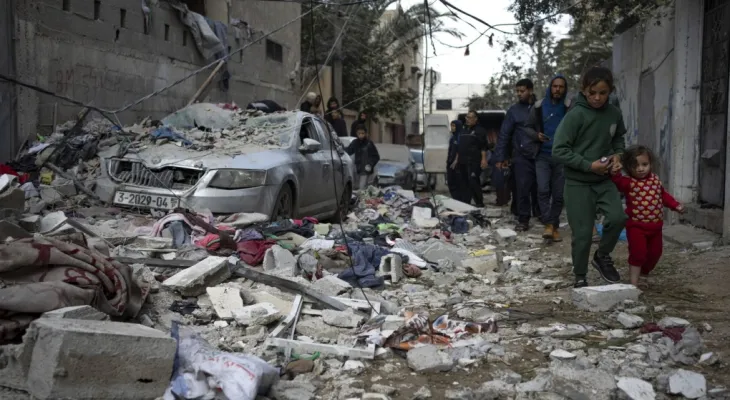Search here
Newspaper
Search here

Arab Canada News
News

Published: February 9, 2024
Israel bombed targets in crowded Rafah early Friday, hours after Biden administration officials and aid agencies warned Israel against expanding its ground offensive into the southern city where more than half of the Gaza Strip’s 2.3 million residents have taken refuge.
Airstrikes overnight into Friday hit two residential buildings in Rafah, while two other sites in central Gaza were bombed, including one that damaged a kindergarten turned shelter for displaced Palestinians, killing 22 people, according to Associated Press journalists who saw bodies arriving at hospitals.
Meanwhile, U.S. President Joe Biden said Thursday that Israel's conduct in the war, ignited by the deadly Hamas attack on October 7, “has crossed a line,” the harshest U.S. criticism so far of its close ally and a sign of concern over the rising civilian death toll in Gaza.
The Hamas-run Gaza Ministry of Health said Friday that the total Palestinian death toll now approaches 28,000 people, about two-thirds of them women and children.
Israel’s declared intentions to expand its ground assault into Rafah also sparked an unusual popular reaction in Washington.
State Department spokesman Vedant Patel said Thursday, “We have not yet seen any evidence of serious planning for such an operation.” Going ahead with such an attack now, “without planning and little consideration for an area sheltering a million people, would be a disaster.”
John Kirby, National Security Council spokesman, said the Israeli ground attack on Rafah “is something we do not support.”
These comments indicate escalating friction between the U.S. and Israeli Prime Minister Benjamin Netanyahu, who has pushed a “complete victory” message in the war this week, while U.S. Secretary of State Antony Blinken was in Israel pressing for a ceasefire deal in exchange for the release of dozens of hostages held by Hamas.
Relief agency officials also issued warnings about the possibility of an attack on Rafah. UNICEF chief Catherine Russell said, “We need the last remaining hospitals, shelters, markets, and water networks in Gaza to be able to keep operating.” “Without them, rates of hunger and disease will rise sharply, leading to more child deaths.”
With the war now entering its fifth month, Israeli ground forces are still focusing on Khan Yunis, just north of Rafah, but Netanyahu has repeatedly said Rafah will be next, causing panic among hundreds of thousands of displaced people.
Netanyahu’s words also alarmed Egypt, which said any ground operation in the Rafah area or mass displacement across the border would undermine the peace treaty it signed with Israel 40 years ago, and the closed border between Gaza and Egypt is also the main entry point for humanitarian aid.
Airstrikes overnight
Just after midnight on Friday, a residential building near the Kuwaiti hospital in Rafah was bombed, killing five members of Al-Sayed’s family, including three children and a woman. A second raid on Rafah killed three others.
Another attack overnight in the central town of Deir al-Balah killed nine people, and in central Gaza, a raid near a kindergarten that had become a shelter damaged the building, killing five people and injuring several others. Witnesses said shelter residents were asleep at the time.
A woman carrying a small child in her arms screamed upon arriving at the local Al-Aqsa Martyrs Hospital: “What can we do? What can we do?” This is the work of the cowardly Zionist enemy who chooses innocent civilians; is this girl launching rockets at the Jews? May God help us.”
Some injured children were treated lying on the ground.
More than half of Gaza’s population has fled to Rafah, following Israeli evacuation orders ahead of a continuing expanded ground offensive by the military, with evacuation orders now covering two-thirds of the blockaded territory, although an estimated 300,000 Palestinians remain in the northern half of Gaza, which civilians were ordered to leave early in the war.
Even in refuge areas like Rafah, Israel routinely conducts airstrikes on what it says are Hamas targets, and the armed group blames civilian casualties on operating from civilian areas.
Working toward a ceasefire
Local health officials said Friday that the ongoing Israeli air and ground attack over four months — among the most destructive in modern history — has killed 27,947 Palestinians and injured more than 67,000 others. The war has forced most people to leave their homes and pushed a quarter of the population toward starvation.
Biden said he continues to work “tirelessly” to pressure Israel and Hamas to agree to an extended ceasefire, which would be linked to the release of dozens of hostages among about 250 taken on October 7, who are believed still held by Hamas.
Netanyahu has rejected Hamas’ demands for a hostage deal that includes ending the war and releasing hundreds of older Palestinian prisoners serving long sentences in Israel for deadly attacks carried out as part of the long-running conflict. Netanyahu dismissed Hamas’ demands as illusory, even as Blinken said he believes continued negotiations, through mediators in Egypt and Qatar, are possible.
Israel’s war goals seem increasingly elusive, with Hamas reemerging in parts of northern Gaza, the initial target of the attack and site of widespread destruction; Israel has rescued only one hostage, while Hamas says many were killed in airstrikes or failed rescue attempts.
Comments